US House sends $460bn spending bill to Senate, averting partial government shutdown
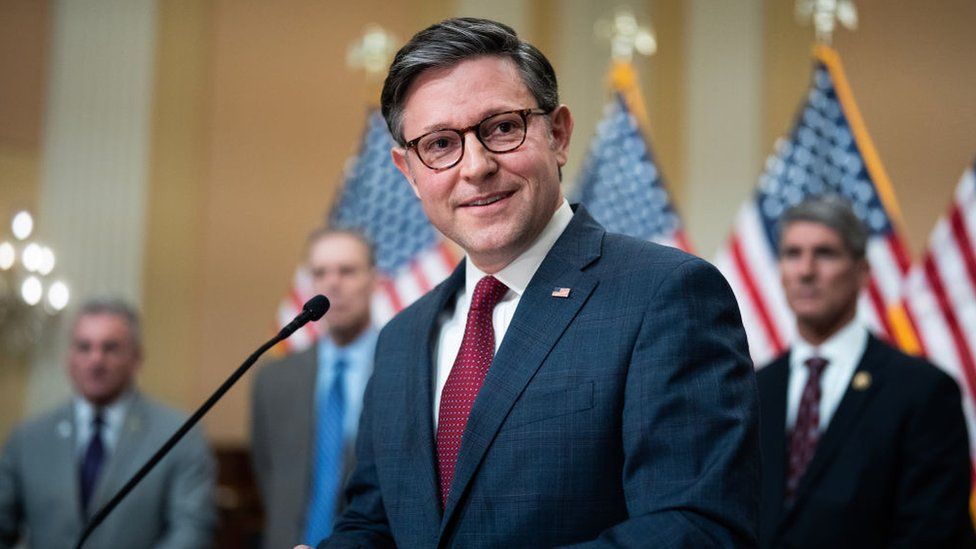
House Speaker Mike Johnson turned to Democrats for the votes needed to pass the spending bill
By Sam Cabral
BBC News, Washington
The US House of Representatives has voted to approve a $467.5bn (£367bn) spending package, the first step in averting a partial government shutdown.
Funding for roughly 30% of the federal government - including agriculture, energy, housing and veterans' affairs - is due to expire at midnight on Friday.
The House-passed bill now goes to the US Senate, where leaders have vowed to back the measure "with time to spare".
But the threat of shutdown looms over Congress once again in just two weeks.
On Wednesday, House lawmakers voted 339-85 on the sprawling package of six funding bills, a compromise jointly agreed between House and Senate leaders after months of negotiation.
Once it passes the Senate and is signed by President Joe Biden, the 1,050-page piece of legislation would extend the funding available for dozens of federal programmes from 8 March until 30 September.
Negotiators, however, have much left to agree on before another funding deadline - on 22 March - for major government agencies such as the defence, homeland security and state departments.
Capitol Hill has been embroiled in bitter spending fights for the past six months between Republicans, who run the House, and Democrats, who lead in the Senate.
House Speaker Mike Johnson has had his work cut out for him by an increasingly narrow Republican majority and, more recently, by conservative rebels.
With the country $34.4tn in debt, the right-wing House Freedom Caucus has demanded spending cuts that often go much deeper than what their Democratic colleagues would accept.
But Mr Johnson told reporters on Wednesday that Republicans "have to be realistic about what we're able to achieve" with their wafer-thin majority.
As has become the case with recent spending measures, he had to turn to Democrats for the votes needed to pass the bill.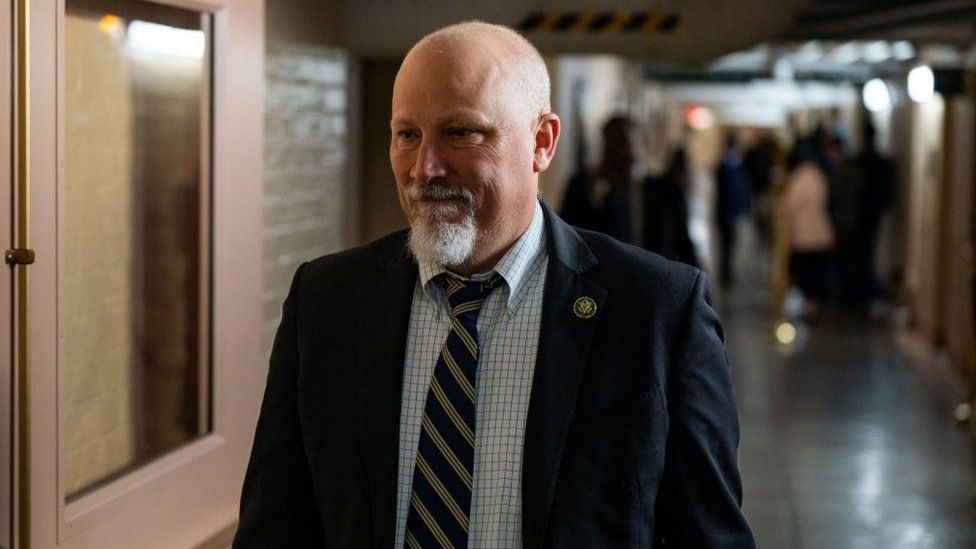
Congressman Chip Roy complained the bill does not deliver the spending cuts demanded by Americans
It is a move that contributed to the dramatic ousting of his predecessor, Kevin McCarthy, last year.
As many as 83 Republicans voted against the bill on Wednesday, with the Freedom Caucus issuing a statement that it "punts on nearly every single Republican policy priority", including immigration.
"Republicans will go around and talk about how they scored major wins, how they somehow delivered for the American people," Texas congressman Chip Roy said on the House floor. "The fact of the matter is we did no such thing."
While the Speaker touted 6% of spending cuts to the FBI, a 10% cut to the Environmental Protection Agency and a 7% cut to the Bureau of Alcohol, Tobacco, Firearms and Explosives, it was the Democrats who celebrated the final product.
Rosa DeLauro of Connecticut told reporters her party had managed to prevent cuts to food and nutrition programmes. They also defeated a Republican effort to defund expanded access to abortion pills.
"This legislation does not have everything either side may have wanted, but I am pleased that many of the extreme cuts and policies proposed by House Republicans were excluded," she said.
By Wednesday night, the Senate had begun deliberating over the bill and was expected to approve it without significant opposition.
The breakthrough comes at an opportune time for President Biden, who will deliver his State of the Union address to Congress on Thursday.
Related Topics
Trump challenges Biden to debates 'anytime' after Super Tuesday wins
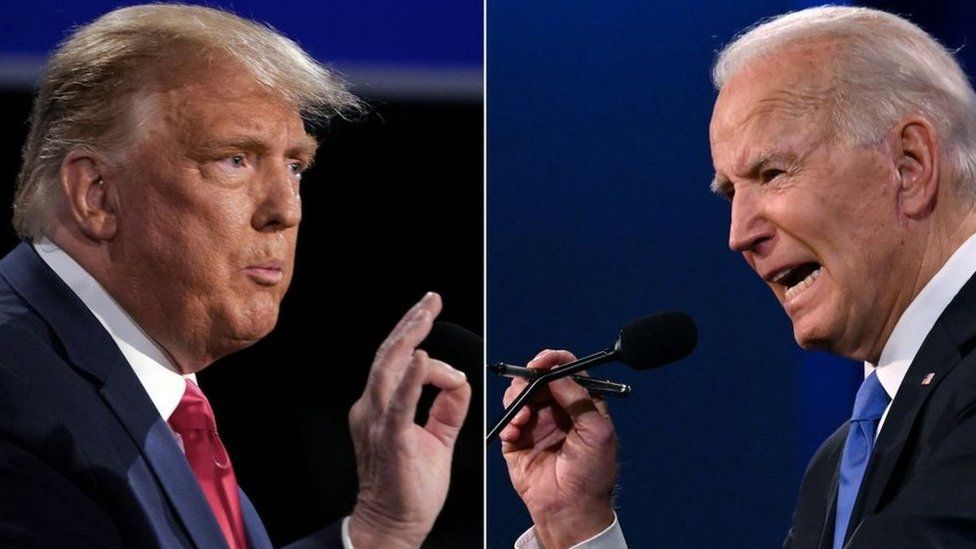
Donald Trump has challenged Joe Biden to TV debates, as the rivals hurtle towards a White House rematch following their sweep of the Super Tuesday votes.
The Republican said he would take part in a TV forum with the Democratic president "anytime, anywhere, anyplace" posting online in all capital letters.
Mr Biden's campaign said Mr Trump was "thirsty for attention and struggling to expand his appeal".
No debates have so far been agreed ahead of November's election.
Mr Trump's challenge came hours after his last Republican rival, Nikki Haley, dropped out of the race to be the Republican nominee for the White House.
- Key takeaways from Super Tuesday results
- Who will Haley voters support in Trump-Biden election?
- Super Tuesday results in full
"It is important, for the Good of our Country, that Joe Biden and I Debate Issues that are so vital to America, and the American People," Mr Trump posted on his social media website, Truth Social, hours after Ms Haley's departure from the race.
He added that such debates could be run by the Democratic National Committee, or the Commission on Presidential Debates, which has overseen presidential debates for the last 30 years.
Mr Trump said the debate commission - which declares itself non-partisan, but is accused by conservatives of bias - was a "subsidiary" of the Democratic party.
Mr Trump, 77, has repeatedly claimed Mr Biden, 81, is too old and forgetful to debate him. Mr Biden has in turn suggested it is Mr Trump who is senile.
The White House press secretary was asked earlier on Wednesday whether refusing a debate could cast doubt on Mr Biden's "acuity". She suggested the reporter speak to the president's re-election campaign.
The Biden campaign did not say whether he would participate in a debate against Mr Trump, and instead suggested that the Republican tune in to the president's Thursday evening State of the Union address to Congress.
"That's a conversation we'll have at the appropriate time in this cycle," said Biden campaign communications director Michael Tyler.
Media caption,
Watch: The state of the union is... Americans fill in the blank
"If he's so desperate to see President Biden in primetime, he doesn't have to wait! He can join the tens of millions of Americans who will tune in to watch the State of the Union tomorrow night," he continued.
On Wednesday, Mr Trump also said that he would watch the State of the Union and "will correct, in rapid response" Mr Biden's speech.
Mr Trump was fiercely criticised after he refused to take part in TV debates with his Republican rivals for the party's White House nomination this election cycle.
He argued at the time that he had nothing to gain from such forums, citing his wide lead in the polls.
Mr Biden and Mr Trump debated each other twice during the 2020 election.
Key takeaways from Super Tuesday results
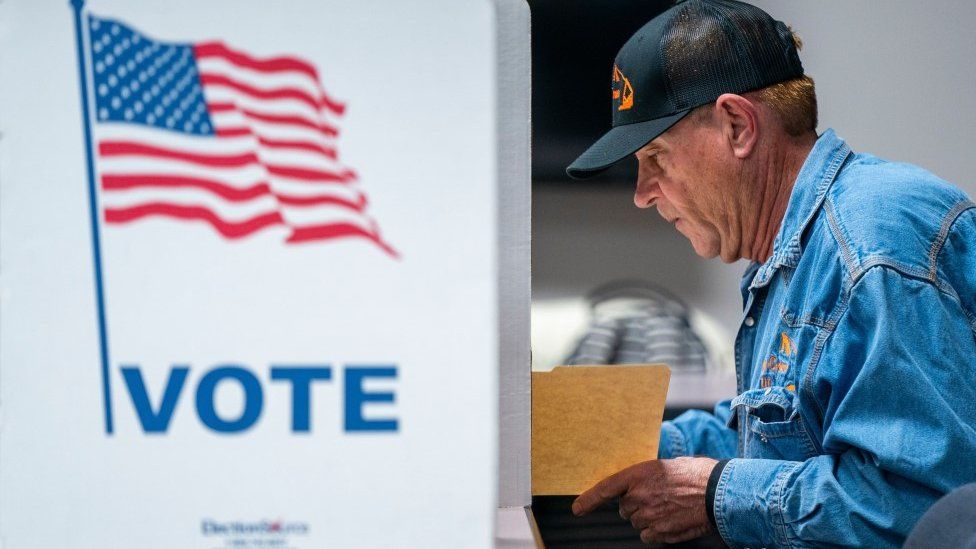 By Anthony Zurcher
By Anthony Zurcher
North America correspondent
Super Tuesday wasn't as super this year due to a slew of predictable results, but there were a few surprises and some warning signs for Donald Trump and Joe Biden ahead of their expected rematch in November.
Here are some of the key takeaways after millions of voters in 15 states and American Samoa chose their preferred party candidates for president.
Full steam ahead for Trump
He posted a dominant performance, with wins in states across the country. "They call it Super Tuesday for a reason," Mr Trump told supporters in Florida. "This is a big one."
Some of the victories were staggering in their size: a 70% margin in Alabama, 61% in Texas, some 70% of the vote in California.
The former president will walk away with a near-insurmountable lead in convention delegates, even if he will have to wait until next week to mathematically lock the Republican nomination.
And with Nikki Haley formally announcing on Wednesday that she will be dropping out of the race, Mr Trump's nomination is just about certain.
Exit polls give some indication of why the former president won so big.
In North Carolina, 43% of Republican primary voters said immigration was the most important issue for them - a topic that has been at the top of Mr Trump's political agenda since he launched his first presidential bid in 2015. In Virginia, 64% said that they trusted Mr Trump over Nikki Haley on border security.
Those Virginia primary voters also said they wanted a candidate who shares their values and fights for people like them- qualities that tilt toward Trump - over temperament and electability.
Electability was one of Ms Haley's central pitches to voters. It apparently fell flat.
But there were some alarm bells
Despite the big win, there were indications of continued disaffection with Mr Trump among some Republican primary voters.
In Virginia and North Carolina, Ms Haley continued to do well in counties with large numbers of young, suburban and college-educated voters - and some of their concerns registered in exit polls.
Forty percent of Republican primary voters in Virginia and 32% in North Carolina said that Mr Trump - who faces four criminal cases - would not be fit to be president if convicted of a crime.
Among North Carolina Haley voters, only 21% said they would vote for the Republican nominee "no matter who it is".
Late on Tuesday night, the Haley campaign pointed to such results and issued a warning. "Today, in state after state, there remains a large bloc of Republican primary voters who are expressing deep concerns about Donald Trump," a spokeswoman said.
Of course, opinions could change in the heat of the autumn general election campaign. Back in 2016, exit polls found that 75% of non-Trump voters in the Republican primary said they would be dissatisfied with Mr Trump as the eventual nominee.
But in the end, 90% of Republicans backed him against Hillary Clinton in the election.
Nikki Haley's Vermont surprise not enough to keep her in race
The former South Carolina governor chose not to hold a public event on the evening of Super Tuesday, perhaps reflecting the campaign's belief that there would be little to celebrate from the day's results.
She could have held a victory party in Vermont where she pulled out a narrow win, her second victory of the primary season.
She campaigned in Burlington on Sunday alongside the state's popular Republican governor, Phil Scott, who said Republicans, independents and Democrats should join together to stop Mr Trump.
- Voters views: 'I wish younger candidates had a chance'
- Haley exits race but stops short of endorsing Trump
In Vermont it worked. In all the other Super Tuesday contests, however, there simply weren't enough anti-Trump voters - even in states like Virginia that allow non-Republicans to vote in the party primary - to translate into wins or even narrow defeats.
Weeks ago, Ms Haley pledged to stay in the race until Super Tuesday, hoping to add to her delegate total. But that was the end of the road.
On Wednesday morning, she held a press conference where she announced that she will be bowing out of the race.
She called on Mr Trump "to earn the votes of those in our party and beyond it who did not support him", though she did not endorse him.
She did not indicate what her future plans might be, but said she looks forward to being a "private citizen".
Earlier this week, she said she did not feel committed, despite an earlier pledge, to support Mr Trump if he is the party's nominee.
Will she ultimately back the former president, despite her recent sharp criticisms? Is she angling for an independent presidential bid? With all the drama now stripped out of the nominating contests, the South Carolinian's future is one of the few immediate sources of mystery.
More on the US election
- Explained: A simple guide to the US 2024 election
- Analysis: Where Biden v Trump will be won and lost
- Policies: What a Trump second term would look like
- Economy: Voters feel better - will that help Biden?
- Recap: The Trump life story to date

Biden struggles to shake Gaza protest vote
In the Michigan primary last week, more than 100,000 voters - 12% of the total - turned out to cast ballots for "uncommitted" instead of the incumbent president, as part of an organised Gaza war protest.
That phenomenon reared its head again on Tuesday. In Minnesota, "uncommitted" garnered approximately 20% of the vote and topped that mark in the counties around Minneapolis, the state's largest city.
In North Carolina, one of the few true general election battleground states on the Super Tuesday schedule, 12% of voters opted for "no preference".
"Tonight's numbers showed that President Biden cannot earn back our votes with just rhetoric," said Vote Uncommitted MN spokesperson Asma Nizami. "Over 35,000 Minnesotans made it clear that Democrats want Joe Biden to change his policies."
Pro-Palestinian groups are already targeting next week's primary in Washington state, which has a sizeable left-wing activist population. If the Biden campaign was hoping that Michigan, with its large population of Arab-Americans, was the beginning and end of the anti-Biden protest vote, Tuesday will have been a rude awakening.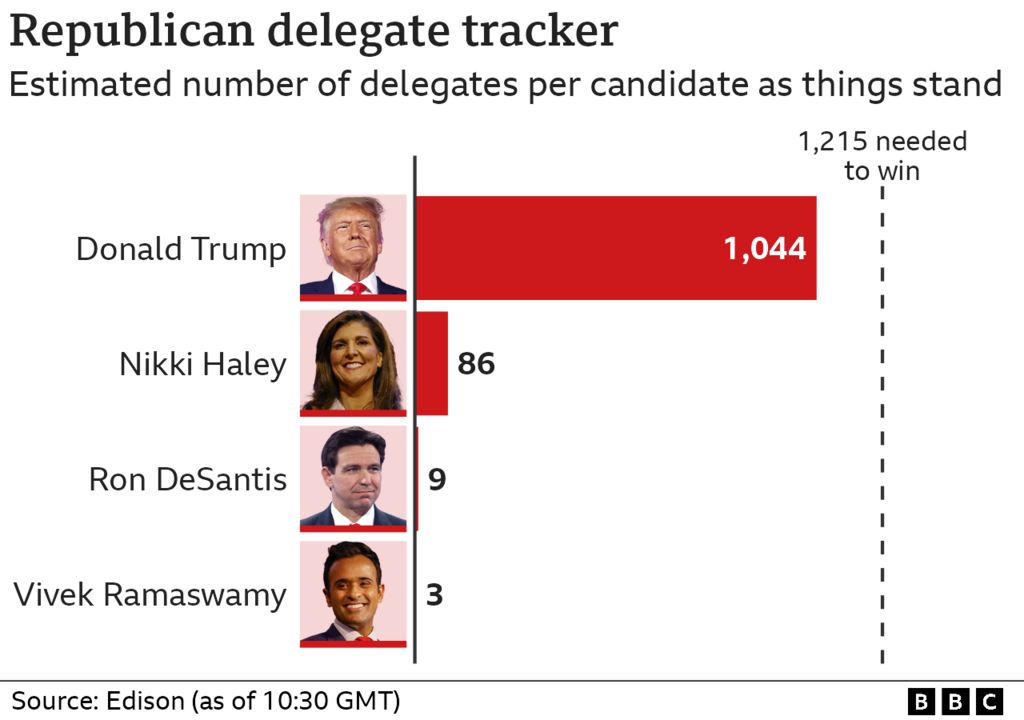
Anthony Zurcher offers his weekly take on the world of American politics:
If you're in the UK, sign up here.
And if you're anywhere else, sign up here.





































